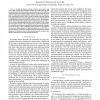Free Online Productivity Tools
i2Speak
i2Symbol
i2OCR
iTex2Img
iWeb2Print
iWeb2Shot
i2Type
iPdf2Split
iPdf2Merge
i2Bopomofo
i2Arabic
i2Style
i2Image
i2PDF
iLatex2Rtf
Sci2ools
130
click to vote
ICC
2007
IEEE
2007
IEEE
Noncooperative Routing with Cooperative Diversity
— Routing in wireless networks confronts more diverse and more rapidly varying characteristics associated with wireless links. Several recent protocols have tried to exploit cooperative diversity to deal with these channel characteristics, but they suffer from large overhead costs due to the need for collaboration among candidate nodes of next hop. We propose a novel routing protocol that is able to realize cooperative diversity without exchanging information among candidate nodes. Our protocol divides the routing decision between the transmitter and the receivers: the transmitter decides the direction and an angle spread to broadcast the packet; each receiver, without communicating each other, decides whether to start a timer whose duration depends on the strength of the channel state information. The node with shortest timer transmits first and thus becomes the transmitter for the next hop. Thus, a multi-hop route is found in a noncooperative way where the communication overhead i...
Related Content
| Added | 02 Jun 2010 |
| Updated | 02 Jun 2010 |
| Type | Conference |
| Year | 2007 |
| Where | ICC |
| Authors | Benjamin R. Hamilton, Xiaoli Ma |
Comments (0)

